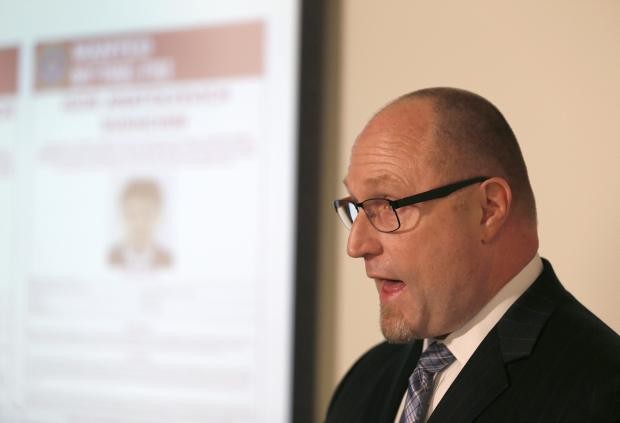
FBI Special Agent in Charge Jack Bennett speaks about a Yahoo security breach during a news conference Wednesday, March 15, 2017, in San Francisco. Two Russian intelligence agents and two hackers have been charged in a devastating breach at Yahoo that affected at least a half billion user accounts, the Justice Department said Wednesday in bringing the first case of its kind against Russian government officials. (Photo by ERIC RISBERG/AP)
WASHINGTON — Two Russian intelligence agents and a pair of hired hackers have been charged in a devastating criminal breach at Yahoo that affected at least a half billion user accounts, the Justice Department said Wednesday in bringing the first case of its kind against current Russian government officials.
In a scheme that prosecutors say blended intelligence gathering with old-fashioned financial greed, the four men targeted the email accounts of Russian and US government officials, Russian journalists and employees of financial services and other private businesses, US officials said.
Using in some cases a technique known as “spear-phishing” to dupe Yahoo users into thinking they were receiving legitimate emails, the hackers broke into at least 500 million accounts in search of personal information and financial data such as gift card and credit card numbers, prosecutors said.
“We will not allow individuals, groups, nation states or a combination of them to compromise the privacy of our citizens, the economic interests of our companies or the security of our country,” said Acting Assistant Attorney General Mary McCord, the head of the Justice Department’s national security division.
One of the defendants, a Canadian and Kazakh national named Karim Baratov, has been taken into custody in Canada. Another, Alexsey Belan, is on the list of the FBI’s most wanted cyber criminals and has been indicted multiple times in the US. It’s not clear whether he or the other two defendants, Dmitry Dokuchaev and Igor Sushchin, will ever step foot in an American courtroom since there’s no extradition treaty with Russia.
“I hope they will respect our criminal justice system,” McCord said.
The indictment identifies Dokuchaev and Sushchin as officers of the Russian Federal Security Service, or FSB. Belan and Baratov were paid hackers who were directed by the FSB to break into the accounts, prosecutors said.
Yahoo didn’t disclose the breach until last September when it began notifying hundreds of millions of users that their email addresses, birth dates, answers to security questions and other personal information may have been stolen. Three months later, Yahoo revealed it had uncovered a separate hack in 2013 affecting about 1 billion accounts, including some that were also hit in 2014.
US officials said it was especially galling that the scheme involved officers from a Russian counterespionage service that theoretically should be working collaboratively with its FBI counterparts.
“Rather than do that type of work, they actually turned against that type of work,” McCord said.
Paul Abbate, an FBI executive assistant director, said the bureau had had only “limited cooperation with that element of the Russian government in the past,” noting that prior US demands to turn over Belan had been ignored.
Though the Justice Department has previously charged Russian hackers with cybercrime – as well as hackers sponsored by the Chinese and Iranian governments – this is the first criminal case to implicate the Russian government so directly in cybercrime and to name as defendants sitting members of the FSB for hacking charges.
The announcement comes as federal authorities investigate Russian interference through hacking in the 2016 US presidential election. One of the defendants, Belan, was among the Russians sanctioned last year following those campaign hacking efforts, though US officials said the investigations were separate.
The indictment, which includes charges of economic espionage, trade secret theft and unauthorized access to protected computers, arise from a compromise of Yahoo user accounts that began at least as early as 2014.
The Justice Department’s assertion that the FSB was directing the hacking likely provides significant political and legal cover for Yahoo, which saw its multibillion-dollar deal with Verizon teeter after it was forced to warn consumers that their private information might have been exposed.
Companies are far more likely to be blamed for security incompetence, with all the attending legal and PR exposure, when their networks are compromised by thieves or wayward teenagers than when they become the targets of sophisticated espionage carried out by foreign governments.
In a statement, Chris Madsen, Yahoo’s assistant general counsel and head of global security, thanked law enforcement agencies for their work.
“We’re committed to keeping our users and our platforms secure and will continue to engage with law enforcement to combat cybercrime,” he said.
Rich Mogull, CEO of the security firm Securosis, said the indictment “shows the ties between the Russian security service and basically the criminal underground,” something that had been “discussed in security circles for years.”
Cyber criminals gave Russian officials access to specific accounts they were targeting, and in return, Russian officials helped the criminals to evade authorities and let them keep the type of information that hackers that hack for money tend to exploit such as email addresses and logins and credit card information.
Mogull said he was surprised the Justice Department was able to name specific individuals and issue the indictment.
“We’ve come to expect that you don’t really figure out who performs these attacks,” he said. The fact that the indictment ties together the FSB and criminals is a new development, he said. “It will be very interesting to see what comes up in court, and how they tie those two together.” –Eric Tucker
* * *
AP writers Ted Bridis in Washington, Michael Liedtke in San Francisco and Mae Anderson in New York contributed to this report.